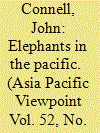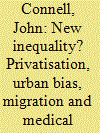|
|
|
Sort Order |
|
|
|
Items / Page
|
|
|
|
|
|
|
| Srl | Item |
| 1 |
ID:
084427


|
|
|
|
|
| Publication |
2008.
|
| Summary/Abstract |
Abstract: Return migration has escaped significant analysis in the Pacific island region. Both migration from and return migration to the Tongan village of Nukunuku are for multiple reasons, with migration centred on employment and education, and return centred on the social context of home and duty. Return is limited, with intentions not being matched with practice, and the village and national population not growing. However, return migrants acquire skills, capital and experience overseas, which can be transferred into a Tongan cultural context, although identities have changed during migration. Return migrants typically take up employment or acquire businesses on return, gain some social status from the outcome, and are neither failures nor retirees. Nonetheless, return engenders expectations and tensions exist between returnees and more established residents, although ultimately, return migrants contribute to household, local and national development, as part of an unfinished process.
|
|
|
|
|
|
|
|
|
|
|
|
|
|
|
|
| 2 |
ID:
171907


|
|
|
|
|
| Summary/Abstract |
The 2011 Bangkok floods, a slow onset event, flooded significant parts of the city. The state's response to flooding followed a traditional cultural and hierarchical approach to justice within Thailand, stemming from Buddhist values, an informal caste system and monarchical order. This resulted in a spatially uneven outcome, with the ‘preservation’ of the central city and two‐month‐long floods in outer suburbs, exacerbated by inadequate management and coordination. Suburban communities sought a more egalitarian notion of disaster justice, with hazard burdens shared more equitably and people having adequate access to decision‐making over the distribution of disaster risk and compensation for damage. Extensive damage, and reduced livelihoods, caused friction between the two views, and protests, contestations and conflicts during the floods, in four different community contexts in northern Bangkok. By generating alternative discourses, challenging the hierarchical notion of justice and taking direct action to removing floodwalls, protesters sought to reshape the spatiality of the floodwater and claim inclusive citizenship and their right to the city. Existing perceptions of disaster justice, usually focused on liberal state responses to understanding disasters as natural episodes, are alone inadequate to explain the outcomes of and responses to disasters in different cultural contexts.
|
|
|
|
|
|
|
|
|
|
|
|
|
|
|
|
| 3 |
ID:
106695


|
|
|
|
|
| Publication |
2011.
|
| Summary/Abstract |
The Chinese, Vietnamese and Lao spaces within the upland Southeast Asian massif, sheltering over 80 million people belonging to geographically dispersed and politically fragmented minority populations, have only recently reopened to overseas academic endeavours. Undertaking social sciences research there among ethnic minority groups is underscored by a specific set of challenges, dilemmas, and negotiations. This special issue brings together Western academics and post-fieldwork doctoral students from the realms of social anthropology and human geography, who have conducted in-depth fieldwork among ethnic minorities in upland southwest China, northern Vietnam, and southern Laos. The articles provide insights into the struggles and constraints they faced in the field, set against an understanding of the historical context of field research in these locales. In this unique context that nowadays interweaves economic liberalisation with centralised and authoritarian political structures, the authors explore how they have negotiated and manoeuvred access to ethnic minority voices in complex cultural configurations. The ethical challenges raised and methodological reflections offered will be insightful for others conducting fieldwork in the socialist margins of the Southeast Asian massif and beyond. This specific context is introduced here, followed by a critique of the literature on the core themes that contributors raise.
|
|
|
|
|
|
|
|
|
|
|
|
|
|
|
|
| 4 |
ID:
152523


|
|
|
|
|
| Summary/Abstract |
Most resettlement in the Pacific, whether for political, economic or environmental reasons, has been in some respects unsuccessful, often resulting in land disputes, social conflicts, marginalisation, impoverishment and return migration. Resettlement after volcanic eruption poses particular problems because of necessary immediacy, temporal uncertainty over the duration of the displacement and the wish of most of those displaced to return, when possible. The eruption of the Manam Island volcano in 2004–2005 displaced over 9000 people to the nearby mainland. Successful resettlement, one of the largest necessitated in the Pacific region, has proved difficult, resulting in land disputes, violence, disease and inertia, as a consequence of 10 years of government inability to achieve a permanent resettlement plan or enact a plan. Despite formal opposition, and intermittent volcanicity, many Manams have chosen to return to the island. The Manam Islanders' experience provides a warning about the complex challenges inherent in population resettlement in only subtly different cultural, geographical and political contexts.
|
|
|
|
|
|
|
|
|
|
|
|
|
|
|
|
| 5 |
ID:
027350


|
|
|
|
|
| Publication |
London, Routledge, 1989.
|
| Description |
229p.
|
| Standard Number |
0415035066
|
|
|
|
|
|
|
|
|
|
|
|
Copies: C:1/I:0,R:0,Q:0
Circulation
| Accession# | Call# | Current Location | Status | Policy | Location |
| 031091 | 327.44/ALD 031091 | Main | On Shelf | General | |
|
|
|
|
| 6 |
ID:
144841


|
|
|
|
|
| Summary/Abstract |
It is widely assumed that the impacts of climate change on atolls will render them uninhabitable. The Carteret Islands, an iconic Pacific atoll, is experiencing physical changes, documented in the media, the outcome of multiple factors, alongside critical economic livelihood problems. Its population has sought to resettle on nearby Bougainville Island, but land has not become available. The search for migration opportunities parallels trends on coral atolls elsewhere where survival strategies have involved regional and international ties, with cultures of migration, focused on more distant international destinations. Carteret Islanders have not been able to mobilise similar relationships. For many atolls and atoll states, migration has increasingly become a livelihood strategy, irrespective of climate change. That is likely to become even more true in the future, but the outcome will be dependent on policies and practices in metropolitan destination states.
|
|
|
|
|
|
|
|
|
|
|
|
|
|
|
|
| 7 |
ID:
109468


|
|
|
|
|
| Publication |
2011.
|
| Summary/Abstract |
Access to health care in developing countries, the main destinations of medical tourists, is notoriously uneven, and often becoming more so. Medical tourism, urban bias and privatisation have combined to exacerbate this trend. This is exemplified in both Thailand and India, where regional areas have been disadvantaged by the migration of health-care workers to hospitals focusing on medical tourism, neo-liberal national financial provision for medical tourism (and related tourism campaigns) and evidence of trickle-down gains is lacking. Medical tourism challenges rather than complements local health care providers, distorts national health care systems, and raises critical national economic, ethical and social questions.
|
|
|
|
|
|
|
|
|
|
|
|
|
|
|
|
|
|
|
|
|